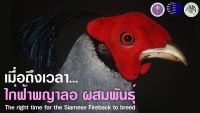Keywords :
Bird Egg Predation; Northern Pig-tailed Macaque
บทคัดย่อ :
Bird nest predation is frequent and widespread in non-human primates. Yet, very few studies focus onthis specific feeding behaviour. Although nest predation is often describes as an opportunisticbehaviour, little is known on foraging strategies and nest detection in primates. Being the prevalentcause of nest failure, nest predation influences both the population and behavioural ecology of tropicalbirds which select specific nest sites and types to reduce detectability and accessibility by predators.Therefore, identifying the nests targeted by the northern pigtailed macaques will help shine light ontheir foraging strategies. In the degraded and fragmented environment of the Sakaerat BiosphereReserve, nest predation is high, representing 65% of losses (Khachma, unpublished data). Snakes arethe main predators (33%) while macaques are just behind, accounting for 25% of predation events.Such high predation rates by macaques raise the question as to if this feeding behaviour isopportunistic or selective. To determine the nature of this feeding behaviour, we studied the influenceof nest type (open-cup or cavity), microhabitat (ex. understory density and canopy cover), density ofnests (i.e., number of nests present within a 100 m radius of a given nest) and the density of predatednests (i.e., number of nests predated within a 100 m radius of a given nest) on nest predation bymacaques, using artificial nests. Our results indicate that predation rates decreased with nest heightbut increased with the number of predated nests, which suggests that, when foraging for eggs, seem to affect predation by macaques. Therefore, we conclude that nest predation by macaques canbe considered as a selective feeding behaviour, with macaques actively searching for this type of richnutritional food.
เอกสารอ้างอิง :
Kaisin, O. (2017). Study of bird egg predation by the northern pigtailed macaque (Macaca leonina) in the Sakaerat Biosphere Reserve (Thailand) using artificial nests.



